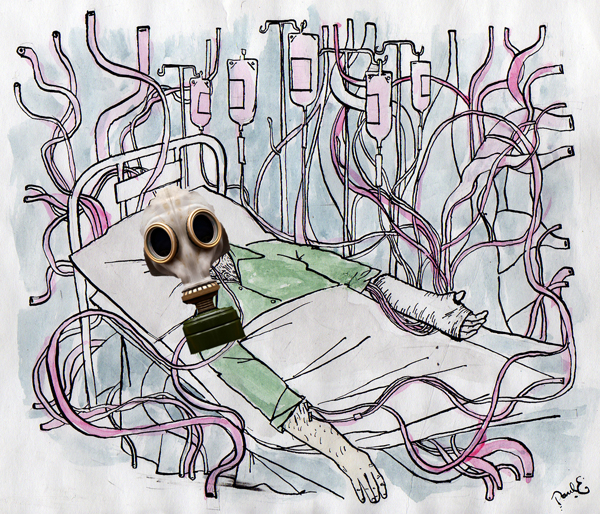In the first installment of his coma diary, Tommy Udo found himself spreadeagled on the pavement being loaded up with ketamine. He never thought it would send him back to the Second World War.
Camden Town, 1943. A big terraced house opposite the stable-yard market that belonged to a retired Royal Navy captain. Of course, there actually isn’t a house like that there: one of the first things I did as soon as I could walk again was to go and have a look. Obviously it was a kind of dream, but a more realistic and highly detailed dream than any I’ve ever had, full of unnecessarily believable features. The woven insulation on electrical chords; Bakelite switches; the truly hideous beige patterned wallpaper; the terrible food " parsnip pie for fuck’s sake " the Chicago roll-top desk where the retired captain did war work for the Admiralty. Charts spread out, typing on an ancient Underwood, heating up red sticks of sealing wax with his lighter. All to do with merchant fleets, but very hush hush.
It was a big house, mostly furnished and decorated in shades of brown. The captain’s wife spoke in one of those shrill Celia Johnson voices that you rarely hear nowadays. Why was I there? There was some back-story to the delusion: I had been bombed out. Wounded in North Africa. My children were with me. This is the weird bit, though: it was my two real life sons, born 2002 and 2005 respectively. My oldest boy was going off to school dressed in short trousers and one of those caps you never see outside of Just William stories. It was snowing. He was going to school in the snow dressed in short trousers and wellies.
Of course, I knew that it couldn’t be real, but it seemed solid enough. Not much happened; days and days passed, I slept, ate, shaved, walked, talked, listened to the wireless, read. I smoked the captain’s Players Navy Cut cigarettes. I had a conversation with him about the war. I told him that I thought that the battle of Stalingrad would be a turning point. He shook his head and talked about the tonnage of shipping being sunk in the Atlantic every month. He gave me a bottle of Johnny Walker which he had been saving. I accepted it gratefully and poured out a stiff one. In real life I’ve been teetotal since I came back from Glastonbury in 1995. In 1943 I remembered this: the Stone Roses cancelled.
All the characters in this wartime home-front reverie were convincing except for me. I was like a wraith; watching, barely solid. I knew how it was all going to end but I couldn’t be arsed telling them.
The captain’s wife upbraided a young woman who was also lodging at the house for listening to dance music on the wireless and going to the Camden Palace which was full of Yanks every night.
Oddly, in the real 1943, it was.



